How engineers of the Montreal Massacre generation are changing the world
On Dec. 6, 1989, a gunman walked into École Polytechnique de Montréal and killed 14 women. During the rampage, the man, who had failed to gain admission to the university, shouted, "You're all a bunch of feminists and I hate feminists!"
Most of those women were studying to be engineers. The brutal, targeted mass shooting hit close to home for other female engineering students of the same generation.
Among them was Mary Wells, who had graduated two years earlier from McGill University, not far from École Polytechnique, and was working for a Hamilton, Ont., steel company.
"It shocked me so much," said Wells. It made her aware of her gender as an engineer in a way she hadn't been before.
Wells went on to do graduate work in materials engineering, and is now Dean of Engineering and Physical Science at the University of Guelph.
One of her current projects is an online tribute to the victims of the Montreal Massacre called 30 Years Later. Created in collaboration with Engineers Canada and the deans of engineering schools across the country, it profiles 30 women who graduated in engineering within three years of the massacre.
Their accomplishments include designing aircraft and creating technology to earthquake-proof buildings, but also go beyond engineering, as these women went on to pursue careers ranging from astronaut and governor general (like Julie Payette) to vice-president of a major Canadian bank.
It's a reminder of what Canadian women contribute as engineers and what the victims of the Montreal Massacre never had a chance to do.
Wells hopes to showcase the tremendous work that women engineers have done and inspire the next generation — "not just for the young women, but also the young men."
She said it's also a defiant demonstration that in the end, the murderer, Marc Lépine, ended up doing the opposite of what he intended.
"You know, that person wanted to get rid of women in engineering ... In fact, the opposite occurred. It really galvanized some people to do some very proactive things around ensuring that women would be welcomed — not only included, but welcomed — into the engineering profession."
CBC News spoke to six other accomplished women engineers of that cohort, including a survivor of the attack, about their love of engineering, their careers and the lasting impact of the massacre.
Josée Boudreau
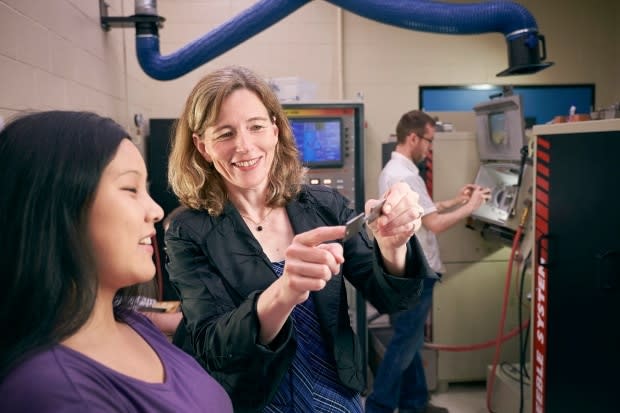
Senior engineering specialist, Bombardier
B.Sc., Mechanical Engineering, University of Moncton, 1992
M.Eng., École Polytechnique de Montréal, 1995
When Josée Boudreau was a teenager in Moncton, N.B., she saw a newspaper ad featuring a large photo of the Canadair CL-415 water bomber. The company was looking for engineers to work on the plane, and it captured her attention.
"I told my parents, 'That's where I want to work,'" recalled Boudreau, who was good at math and physics and had already decided she wanted to be an engineer, like her father.
The Montreal Massacre happened during her third year studying engineering at the University of Moncton. She was deeply shaken by it, as École Polytechnique was the other francophone engineering school she might have gone to. "I would have been in that school that day."
Boudreau went on to earn a master's degree at École Polytechnique. As part of the program, she did an internship at Bombardier (which acquired Canadair in 1986), and has worked there ever since.
Over her career, she has worked on the aerodynamic design of half a dozen aircraft, including the Challenger business jets, the CRJ aircraft used in lots of short-haul regional flights and the C Series jets that Bombardier sold to Airbus in 2017. She's had a chance to do computer programming, create designs using engineering software and travel to do wind tunnel tests all over the world. While she loves designing things and solving problems, what she loves most about engineering is the teamwork.
"Engineering is not something you do alone," she said. "The team spirit is something that is very important in the everyday life of an engineer, because you cannot know everything, and it's the team that brings the best out of you."
Boudreau acknowledges that for most of her career, she has been the only woman on her team, and that's not always easy: "It's still a man's world. You need to be strong and you need to be comfortable with men. You need to be confident."
She hopes that on the anniversary of the Montreal Massacre, people think first and foremost of the families that have had to live without their daughters, sisters and spouses, and the women who never got a chance to pursue their goals.
"I had a dream to work in engineering and to work for Bombardier. Maybe some of these women [did] also."
Boudreau hopes thinking about the event will encourage people to talk to their children in a more gender-neutral way, "so that they don't limit their girls and do not limit their boys in what they can achieve in life. And give them the confidence to achieve their goals."
Gina Parveneh Cody

Retired, previously president and principal shareholder of CCI Group Inc.
B.Eng., Aryamehr University of Technology, Tehran, 1978
M.Eng., Concordia University, 1981
PhD, Building Engineering, Concordia University, 1989
Gina Parveneh Cody grew up in Iran, and her father always emphasized that men and women should be equal,
"From childhood," she recalled, "I really liked fixing up things if something was broken."
She was the one who repaired the family's TV, radio or broken furniture. When she got older, Cody decided to study civil engineering. Eventually, her studies took her to Canada, where she became the first woman to graduate with a PhD in building engineering from Concordia University in Montreal.
Her doctoral research was inspired by all of the deaths in Iran from buildings collapsing during earthquakes. She worked on the development of friction dampers to protect steel and concrete buildings from earthquakes. Such devices are now used all over the world.
The Montreal Massacre happened the same year that she graduated, not far from where she studied. She still gets emotional when she thinks of it.
"I want those women to be remembered for who they were, who they wanted to be," Cody said. "They were shot because they were women and they wanted to be engineers. Even today, people talk about women not belonging. That makes me angry."
After graduating, Cody worked on building codes for the Ontario government, then became a machine inspector. That work led her to become the first woman to climb Toronto construction cranes.
Being the only woman had pros and cons, she said. On the upside, "they all remembered me. They all knew who I was."
The downside was she felt she needed to work extra hard to prove herself. "I always believed as a woman, I had to be better. I couldn't afford making mistakes," she added. "I felt that pressure."
Cody went on to become president and principal shareholder of the construction engineering firm CCI Group Inc. She retired after selling the firm in 2016.
In 2018, Concordia renamed its engineering school after her. The Gina Cody School of Engineering and Computer Science is the first university engineering faculty in Canada to be named after a woman.
Cody said that has given her a platform to advocate for women in science and engineering: "That's really my new career."
Deepa Kundur
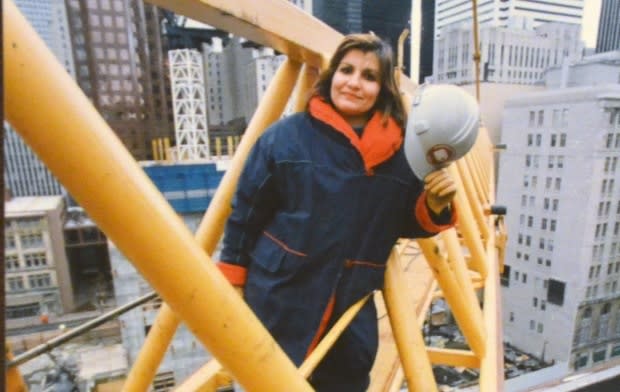
Professor and Chair, Edward S. Rogers Sr. Department of Electrical and Computer Engineering, University of Toronto
B.ASc., Electrical and Computer Engineering, University of Toronto, 1993
M.ASc., Electrical and Computer Engineering, University of Toronto, 1995
PhD, Electrical and Computer Engineering, University of Toronto, 1999
As a girl, Deepa Kundur always enjoyed math and science.
"For me, it was very logical," she recalled. Her father, who was an engineer, suggested she study electrical engineering because it was mathematical, but could also be used to build systems and solve real-life problems.
At that time, she recalled, young women were told they should shoot for the stars, and even though there were few women in her class, she felt she was like everyone else. She was three months into her undergraduate degree at the University of Toronto when the massacre happened.
"This was quite disorienting," Kundur recalled. "It really distinguished people by their gender."
She said it was the support of role models and mentors that helped get her and other young women studying engineering through the tragedy.
Kundur went on to do two more engineering degrees and become a professor, doing research in the area of cybersecurity. She was one of the pioneers of a technology called digital watermarking, which identifies illegal duplicates of review copies of films shared with critics before their release. She has also worked on methods to detect intruders or unwanted activity on computer networks. Currently, she's working on ways to make electrical smart grids more resilient against cyberattacks by studying how flocks of birds deal with obstacles or predators.
"I love to discover new interrelationships and new analogies between natural and artificial systems," she said.
As a professor, she also takes her job as a mentor to young women very seriously.
"I think we need very much role models who are women ... to be able to, you know, demonstrate to other women what's possible if they choose a technical career," Kundur said, adding that engineers are well equipped to promote equity and diversity. "We're educated to solve problems … we can consider this to be another problem — a societal problem — and we can use our skills in problem solving to address these issues."
Colette Lepage
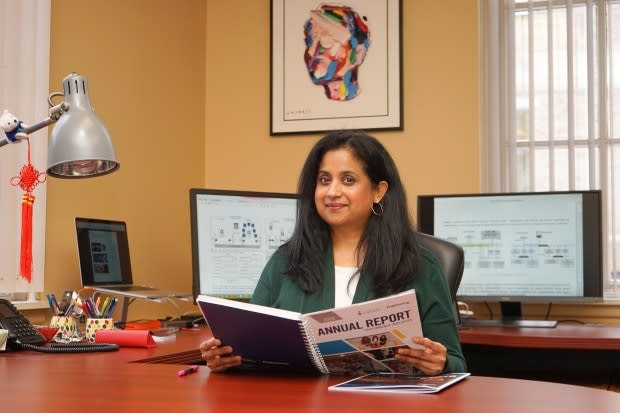
Founder and owner, Lepage Consulting
Diploma, Chemical Engineering Technology, Cambrian College, 1994
B.Sc., Chemical Engineering, Lakehead University, 1999
Colette Lepage is a couple of years younger than the youngest victims of the massacre, which happened when she was in high school in Sudbury. She said she doesn't remember that much about it except the shock, sadness and horror of it.
As a girl, she was a self-described "sci-fi nerd" who loved looking up at the stars, but wasn't a particularly gifted student. She liked science, but didn't want a desk job. So she earned a chemical engineering technology diploma, which she thought would help her get a job in the local forestry or mining industries, and went on to get a degree.
After moving to the U.S. with her boyfriend at the time, Lepage saw an ad for an entry-level job at NASA's Goddard Space Flight Center. When she got the job, she recalled, "I was so excited, like, 'Oh my god, it's my dream come true.'"
Ever since, she has worked in contamination control for equipment destined to launch into space during servicing missions for NASA's Hubble Space Telescope and its successor, the James Webb Telescope, currently set to launch in 2021.
Lepage was at one time the manager of the clean room that housed the hardware for the Hubble servicing missions, one of the largest in the world.
One of the projects she worked on was Hubble's Wide Field Camera 3, which upgraded the telescope to be able to peer deeper into space than ever before. She recalls watching the launch with her team.
"It dawned on me, oh my goodness, this isn't just about me and this little group of people," she said. "We're part of a team that's, you know, shaping how we view the universe. Everything we learn is basically going to be new knowledge and for the whole entire world — for all of humanity."
Now, she's a consultant in the same field, travelling around North America. "I've always felt very, very grateful for the opportunity I had," she said.
Sandra Odendahl
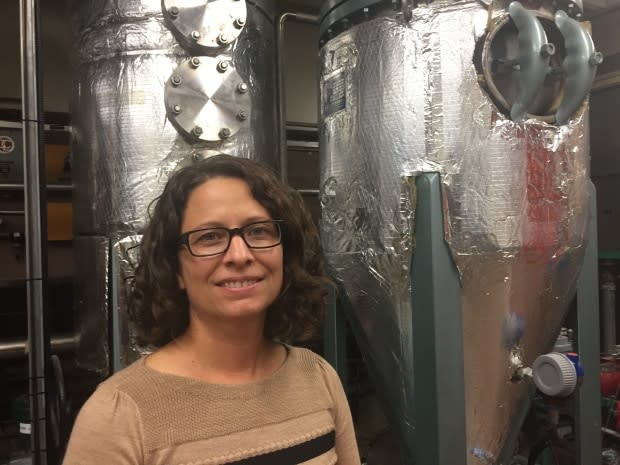
Vice president of Social Impact and Sustainability, Scotiabank
B.Sc, Chemical Engineering, University of Ottawa, 1987
M.Sc., Chemical Engineering, University of Toronto, 1990
When Sandra Odendahl completed the requirements for her master's degree in chemical engineering, she moved to Montreal to work for natural resources firm Noranda. The massacre happened on her third day of work.
"It definitely felt close to home," she recalled. "I wasn't even finished my engineering degree and [had] just started my first job down the road from where this thing happened."
Odendahl had been hired to run environmental projects in forestry and pulp and paper, following up on her research on contaminants that come from bleaching pulp. As she progressed in her career, her focus on environmental impact assessments for natural resources projects, including mines, brought her in contact with investment bankers.
She ended up being hired by RBC as an industry analyst for the natural resources sector 16 years ago, and has been in banking ever since, working in environmental risk management, corporate sustainability, social finance and impact investing.
"I think there's two things that engineers can bring to banking or probably a lot of sectors," she said. "One is definitely a comfort with math. I think the other one is a really structured approach to solving problems."
Odendahl acknowledged that like engineering, pockets of the financial sector such as investment banking remain male-dominated. But she thinks the industry recognizes the importance of innovation and diversity: "It's a fundamental fact that you can't get innovation from a group of people who all think the same."
While the Montreal Massacre is an extreme example, she said it's a reminder that even today, not everyone is comfortable seeing women in places traditionally dominated by men.
"It's important that we don't forget that this happened and that it holds our feet to the fire to make sure that we just don't accept people ... who are pushing back against gender diversity and other kinds of diversity."
Nathalie Provost
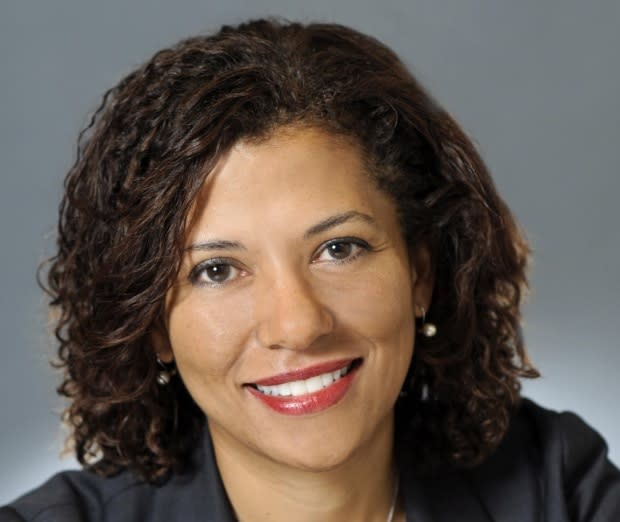
Regional Director of Analysis and Expertise for Estrie-Montérégie, Quebec Ministry of the Environment and Climate Change
B.Eng., Mechanical Engineering, École Polytechnique de Montréal, 1990
M.Eng., Industrial Engineering, École Polytechnique de Montréal, 1993
Nathalie Provost is a survivor of the massacre. She was hit with four bullets during the attack, including one that grazed her forehead and another that lodged in her foot. When Lépine accused the women he attacked of being feminists, she responded that they weren't. "Listen, we are only women who are studying engineering," she recalled from her hospital bed two days after the attack.
Provost returned to school less than a month after the shooting and earned the first of two engineering degrees months later. She was awarded the Governor General's Medal of Bravery in 1992.
In high school, Provost was good at science, but wanted to do something applied. Boys in her class were going into engineering. "So why not me?" she recalled.
She graduated amid the recession of the early '90s and managed to find a job with a small consulting firm working to improve quality and efficiency on projects for organizations such as Hydro-Québec.
Eventually, she found her way into the Quebec public service, taking management roles in a variety of departments on projects such as transforming the IT systems.
"You learn as an engineer to solve problems," she said. "That's why I've always felt that I worked as an engineer even if I was working for Curateur public du Québec [the office of the province's public trustee] or the immigration department."
Outside work, she has advocated for gun control and been a supporter of young women training to be engineers through her role as "godmother" of the Order of the White Rose, an annual scholarship open to students across Canada that pays tribute to the victims of the massacre.
On this anniversary of the massacre, Provost worries that the world has become a tougher place, with more loneliness and unhappiness than 30 years ago.
"We can meet chaos really quickly," she said. "I think remembering what happened in Polytechnique is to be aware that what we have is fragile and we must take care of each other."

